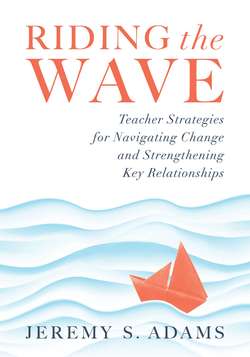Читать книгу Riding the Wave - Jeremy S. Adams - Страница 19
На сайте Литреса книга снята с продажи.
The Cumulative Toll of the 21st Century
ОглавлениеIn Take Time for You, educational consultant and author Tina H. Boogren (2018) eloquently explains through a series of powerful inquiries why self-care ought to be at the forefront of educational concerns. She asks, “What if teachers learn to take care of themselves while taking care of their students? What if it weren’t an either-or situation? What if you split your time between your own and students’ needs in a new way?” (Boogren, 2018, p. 4). But why these questions? Why now? Why is self-care quickly becoming an increasingly talked-about subject in the realm of professional development?
Teachers in previous eras certainly encountered their share of high hurdles. As education historian Dana Goldstein (2014) observes in The Teacher Wars, at different times in American history “teachers have been embattled by politicians, philanthropists, intellectuals, business leaders, social scientists, activists on both the Right and Left, parents, and even one another” (p. 5). In the 1960s, national paranoia swept the land as Americans feared their Soviet counterparts would triumph over them in the disciplines of mathematics and science. The 1970s were embroiled in racial tensions stoked by concerns about integration and busing. The 1980s bemoaned a lack of cultural literacy. While many of these concerns have faded into the background of the nation’s consciousness, the essential role the teacher plays in the maintenance of a growing and vibrant society firmly remains. This is why it is important to explore why there is something fundamentally different about the nature of teacher morale and strain in the 21st century.
As Patricia Jennings, a professor of education, notes (as cited in Garrison Institute, 2009):
We ask an awful lot of teachers these days.… Beyond just conveying the course material, teachers are supposed to provide a nurturing learning environment, be responsive to students, parents, and colleagues, juggle the demands of standardized testing, coach students through conflicts with peers, be exemplars of emotion regulation, handle disruptive behavior and generally be great role models.… The problem is we rarely give teachers proper training or resources for any of them. (p. 1)
In April 2015, Steven C. Ward (2015) of Newsweek sought to answer the question, “Why has teacher morale plummeted?” In his article, he offers a variety of diverse and insightful explanations, ranging from teachers’ “lost control of curricula” and the embrace of “edu-fashions” claiming to be one-size-fits-all solutions (for example, competency-based education, flipped classrooms, and the charter school movement) to “enrollment declining in teaching programs” (Ward, 2015). And as 2012 Connecticut Teacher of the Year David Bosso (2017) writes, “For a variety of reasons, but most certainly due to the increased demands of the evolving educational landscape, teachers often experience a discrepancy between the moral and affective purposes of their work and the external forces that affect it.”
All these explanations have an element of truth to them. The constancy of policy changes is disorienting and frankly demoralizing—another common observation of new retirees. The frequency with which teachers are asked to absorb and master new trends (in technology, instruction, or social experimentation) is exhausting. In 2012, MetLife released a study titled The MetLife Survey of the American Teacher, and the study’s executive summary and major findings sections both support the contention that teachers are battling the strains of endless reform yet are receiving a woeful lack of support (MetLife, 2012). Some disheartening highlights from this study’s surveys, conducted in 2011, reveal the following (MetLife, 2012).
Sixty-three percent of teachers reported that class sizes were increasing.
According to 34 percent of teachers, “educational technology and learning materials [had] not been kept up to date” (p. 7).
Almost two-thirds of teachers (64 percent) reported that the number of families requiring social support services had increased.
Clearly, classroom teachers are having to make do with insufficient materials while educating more and more students, many of whom are struggling outside school and may require extra care at school. Add all these factors together, and teaching in the 21st century has a psychological toll. The changing policy landscape coupled with the psychological stresses of education highlights the extent to which classroom instruction and teachers’ perceptions of their place within the profession have categorically changed between 2010 and 2020 alone. The American Federation of Teachers (2017) reports that half of all teachers have experienced a significant decline in their enthusiasm for the job. Moreover, a significant portion of them (26 percent) do not even feel safe on the job, as they have been “bullied, harassed or threatened” (American Federation of Teachers, 2017, p. 4).
Teachers have long complained about the fact that they lack a voice in setting policy and they lack power in dictating the direction of education in their state or community; in fact, this shared feeling dates as far back as 1988, when the New York Times published an article titled “Study Shows Teachers Still Feel Left Out on Policy” (Daniels, 1988). Similarly, when teachers are in the midst of constant change, they feel a lack of power, as the challenges that confront them are often beyond their control. This feeling of powerlessness that accompanies mounting responsibilities and policy reform often results in so much stress that teachers don’t realize they can control how they respond to challenges—or practice self-care. Indeed, it is no coincidence that the first chapter of this book tackles the issue of taking teacher self-care seriously.
NOTICE the WAVE
What are some examples of tasks and responsibilities you never thought you would have to take on when you first became a teacher? How did you initially respond to these tasks and responsibilities once they became your own?
